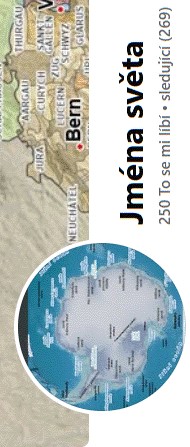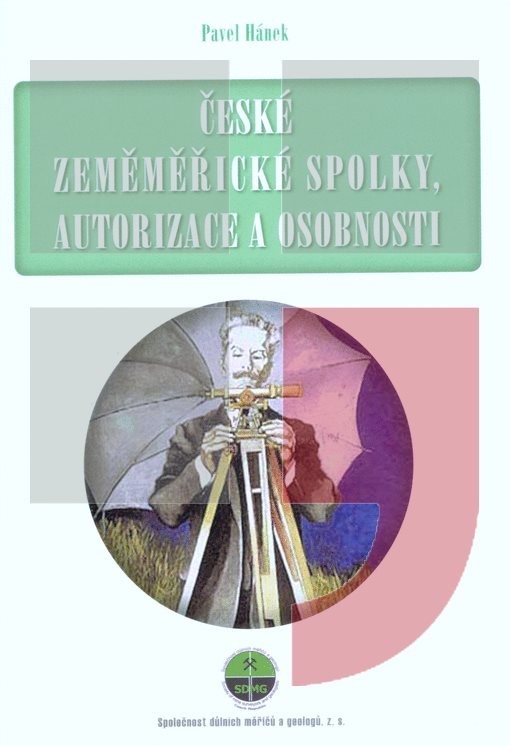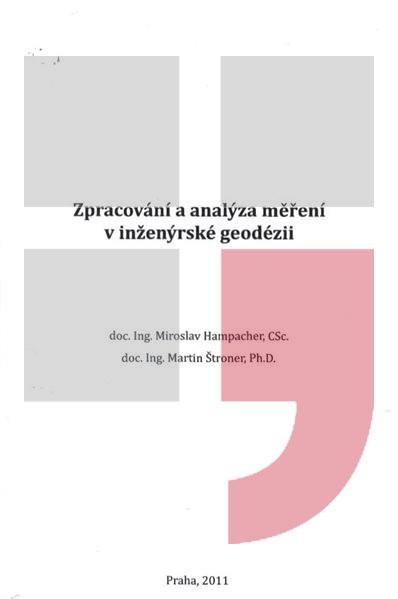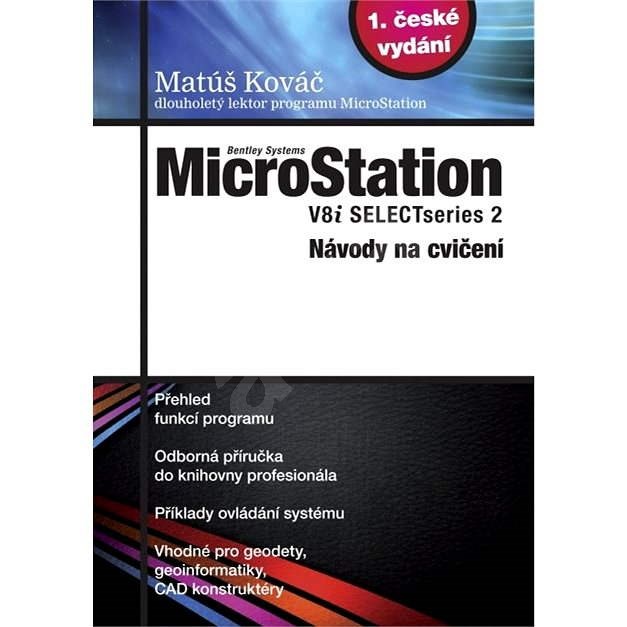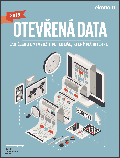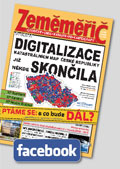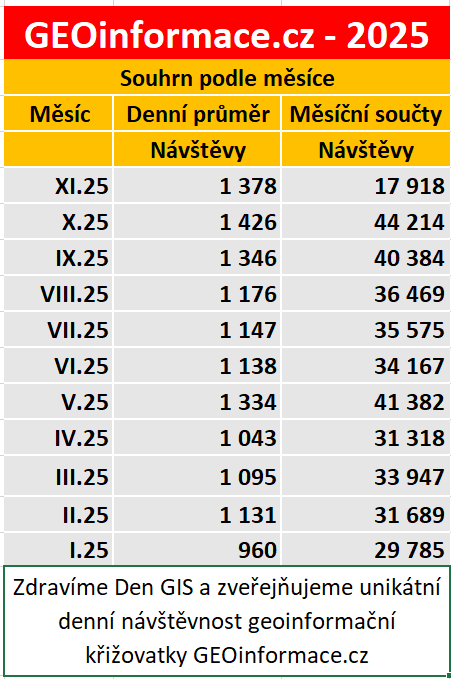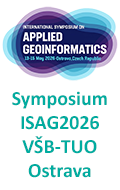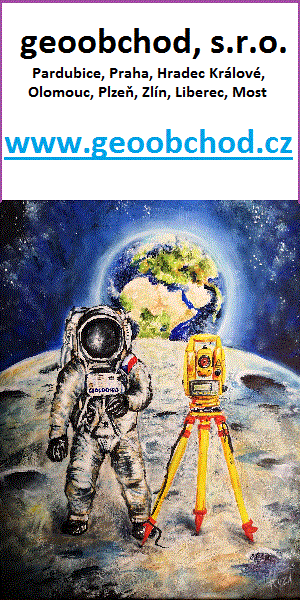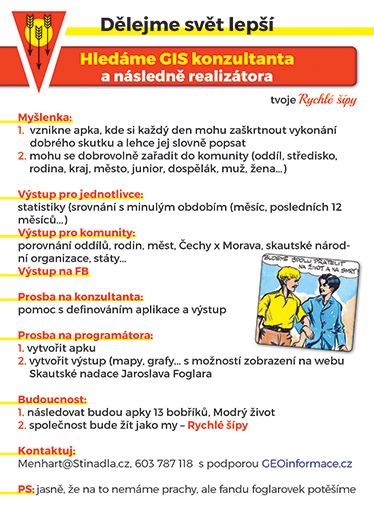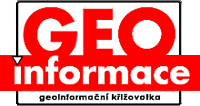zprávy
zdroje zpráv:Seznam katastrálních území s probíhající revizí údajů katastru:
23.4.2019 9:26 ČÚZK - předpisy a opatření Katastrální úřad pro Moravskoslezský kraj - Katastrální pracoviště Karviná zveřejnil novou aktualitu: Katastrální pracoviště Karviná informuje vlastníky a jiné oprávněné a zároveň odbornou veřejnost, že v rámci jeho územní působnosti je prováděna revize údajů katastru nemovitostí.Seznam katastrálních území s probíhající revizí údajů katastru:
Český Těšín.
Podrobnosti k jednotlivým činnostem jsou uvedeny v oznámeních na úředních deskách obecního úřadu a katastrálního pracoviště.
Seznam katastrálních území s probíhající revizí údajů katastru:
23.4.2019 9:26 ČÚZK - předpisy a opatření Katastrální úřad pro Moravskoslezský kraj - Katastrální pracoviště Karviná zveřejnil novou aktualitu:
Katastrální pracoviště Karviná informuje vlastníky a jiné oprávněné a zároveň odbornou veřejnost, že v rámci jeho územní působnosti probíhá v katastrálních územích
Český Těšín
revize katastru nemovitostí. Podrobnosti k jednotlivým činnostem jsou uvedeny v oznámeních na úředních deskách obecního a katastrálního úřadu.
Seznam katastrálních území s probíhající revizí údajů katastru:
23.4.2019 9:26 ČÚZK - předpisy a opatření Katastrální úřad pro Moravskoslezský kraj - Katastrální pracoviště Karviná zveřejnil novou aktualitu: Katastrální pracoviště Karviná informuje vlastníky a jiné oprávněné a zároveň odbornou veřejnost, že v rámci jeho územní působnosti je prováděna revize údajů katastru nemovitostí.Seznam katastrálních území s probíhající revizí údajů katastru:
Dětmarovice,
Závada nad Olší,
Koukolná,
Poruba u Orlové.
Podrobnosti k jednotlivým činnostem jsou uvedeny v oznámeních na úředních deskách obecního úřadu a katastrálního pracoviště.
Seznam katastrálních území s probíhající revizí údajů katastru:
23.4.2019 9:26 ČÚZK - předpisy a opatření Katastrální úřad pro Moravskoslezský kraj - Katastrální pracoviště Karviná zveřejnil novou aktualitu: Katastrální pracoviště Karviná informuje vlastníky a jiné oprávněné a zároveň odbornou veřejnost, že v rámci jeho územní působnosti je prováděna revize údajů katastru nemovitostí.Seznam katastrálních území s probíhající revizí údajů katastru v roce 2022:
Dolní Lutyně
Petrovice u Karviné
Podrobnosti k jednotlivým činnostem jsou uvedeny v oznámeních na úředních deskách obecního úřadu a katastrálního pracoviště.
Seznam katastrálních území s probíhající revizí údajů katastru:
23.4.2019 9:26 ČÚZK - předpisy a opatření Katastrální úřad pro Moravskoslezský kraj - Katastrální pracoviště Karviná zveřejnil novou aktualitu: Katastrální pracoviště Karviná informuje vlastníky a jiné oprávněné a zároveň odbornou veřejnost, že v rámci jeho územní působnosti je prováděna revize údajů katastru nemovitostí.Seznam katastrálních území s probíhající revizí údajů katastru:
Kopytov,
Koukolná,
Podobora,
Poruba u Orlové,
Věřňovice,
Závada nad Olší.
Podrobnosti k jednotlivým činnostem jsou uvedeny v oznámeních na úředních deskách obecního úřadu a katastrálního pracoviště.
Seznam katastrálních území s probíhající revizí údajů katastru:
23.4.2019 9:26 ČÚZK - předpisy a opatření Katastrální úřad pro Moravskoslezský kraj - Katastrální pracoviště Karviná zveřejnil novou aktualitu: Katastrální pracoviště Karviná informuje vlastníky a jiné oprávněné a zároveň odbornou veřejnost, že v rámci jeho územní působnosti je prováděna revize údajů katastru nemovitostí.Seznam katastrálních území s probíhající revizí údajů katastru v roce 2023:
Petrovice u Karviné,
Prstná,
Dolní Marklovice,
Dětmarovice.
Podrobnosti k jednotlivým činnostem jsou uvedeny v oznámeních na úředních deskách obecního úřadu a katastrálního pracoviště.
Seznam katastrálních území s probíhající revizí údajů katastru:
23.4.2019 9:26 ČÚZK /Urady/Katastralni-urady/Katastralni-urady/Katastralni-urad-pro-Moravskoslezsky-kraj/Katastralni-pracoviste/KP-Karvina/O-uradu/Aktuality/Seznam-katastralnich-uzemi-s-probihajici-revizi-udSeznam katastrálních území s probíhající revizí údajů katastru:
23.4.2019 9:26 ČÚZK - předpisy a opatření Katastrální úřad pro Moravskoslezský kraj - Katastrální pracoviště Karviná zveřejnil novou aktualitu: Katastrální pracoviště Karviná informuje vlastníky a jiné oprávněné a zároveň odbornou veřejnost, že v rámci jeho územní působnosti je prováděna revize údajů katastru nemovitostí.Seznam katastrálních území s probíhající revizí údajů katastru v roce 2024:
Dolní Marklovice,
Dětmarovice,
Závada nad Olší,
Koukolná,
Poruba u Orlové.
Podrobnosti k jednotlivým činnostem jsou uvedeny v oznámeních na úředních deskách obecního úřadu a katastrálního pracoviště.
Seznam katastrálních území s probíhající revizí údajů katastru:
23.4.2019 9:26 ČÚZK - předpisy a opatření Katastrální úřad pro Moravskoslezský kraj - Katastrální pracoviště Karviná zveřejnil novou aktualitu:Katastrální pracoviště Třinec informuje vlastníky a jiné oprávněné a zároveň odbornou veřejnost, že v rámci jeho územní působnosti probíhá v katastrálním území
revize katastru nemovitostí. Podrobnosti k jednotlivým činnostem jsou uvedeny v oznámeních na úředních deskách obecního a katastrálního úřadu.Seznam katastrálních území s probíhající revizí údajů katastru:
Seznam katastrálních území s probíhající revizí údajů katastru:
23.4.2019 9:26 ČÚZK - předpisy a opatření Katastrální úřad pro Moravskoslezský kraj - Katastrální pracoviště Karviná zveřejnil novou aktualitu: Katastrální pracoviště Karviná informuje vlastníky a jiné oprávněné a zároveň odbornou veřejnost, že v rámci jeho územní působnosti je prováděna revize údajů katastru nemovitostí.Seznam katastrálních území s probíhající revizí údajů katastru v roce 2021:
Dolní Lutyně.
Podrobnosti k jednotlivým činnostem jsou uvedeny v oznámeních na úředních deskách obecního úřadu a katastrálního pracoviště.
Seznam katastrálních území s probíhající revizí údajů katastru:
23.4.2019 9:26 ČÚZK - předpisy a opatření Katastrální úřad pro Moravskoslezský kraj - Katastrální pracoviště Karviná zveřejnil novou aktualitu: Katastrální pracoviště Karviná informuje vlastníky a jiné oprávněné a zároveň odbornou veřejnost, že v rámci jeho územní působnosti je prováděna revize údajů katastru nemovitostí.Seznam katastrálních území s probíhající revizí údajů katastru v roce 2022:
Dolní Lutyně.
Podrobnosti k jednotlivým činnostem jsou uvedeny v oznámeních na úředních deskách obecního úřadu a katastrálního pracoviště.
Seznam katastrálních území s probíhající revizí údajů katastru:
23.4.2019 9:26 ČÚZK /Urady/Katastralni-urady/Katastralni-urady/Katastralni-urad-pro-Moravskoslezsky-kraj/Katastralni-pracoviste/KP-Karvina/O-uradu/Aktuality/Seznam-katastralnich-uzemi-s-probihajici-revizi-udSeznam katastrálních území s probíhající revizí údajů katastru:
23.4.2019 9:26 ČÚZK - předpisy a opatření Katastrální úřad pro Moravskoslezský kraj - Katastrální pracoviště Karviná zveřejnil novou aktualitu: Katastrální pracoviště Karviná informuje vlastníky a jiné oprávněné a zároveň odbornou veřejnost, že v rámci jeho územní působnosti je prováděna revize údajů katastru nemovitostí.Seznam katastrálních území s probíhající revizí údajů katastru v roce 2020:
Český Těšín,
Horní Lutyně.
Podrobnosti k jednotlivým činnostem jsou uvedeny v oznámeních na úředních deskách obecního úřadu a katastrálního pracoviště.
Seznam katastrálních území s probíhající revizí údajů katastru:
23.4.2019 9:26 ČÚZK - předpisy a opatření Katastrální úřad pro Moravskoslezský kraj - Katastrální pracoviště Karviná zveřejnil novou aktualitu:Seznam katastrálních území s probíhající revizí údajů katastru:
Ráj (termín dokončení - 11/2019)
Seznam katastrálních území s probíhající revizí údajů katastru:
23.4.2019 9:26 ČÚZK - předpisy a opatření Katastrální úřad pro Moravskoslezský kraj - Katastrální pracoviště Karviná zveřejnil novou aktualitu: Katastrální pracoviště Karviná informuje vlastníky a jiné oprávněné a zároveň odbornou veřejnost, že v rámci jeho územní působnosti je prováděna revize údajů katastru nemovitostí.Seznam katastrálních území s probíhající revizí údajů katastru v roce 2020:
Český Těšín,
Dolní Lutyně,
Horní Lutyně.
Podrobnosti k jednotlivým činnostem jsou uvedeny v oznámeních na úředních deskách obecního úřadu a katastrálního pracoviště.
Seznam k. ú. s probíhající obnovou operátu a revizemi katastru v působnosti KP Opava
23.4.2019 9:20 ČÚZK - předpisy a opatření Katastrální úřad pro Moravskoslezský kraj - Katastrální pracoviště Opava zveřejnil novou aktualitu: Katastrální pracoviště Opava informuje vlastníky a jiné oprávněné a zároveň odbornou veřejnost, že v rámci jeho územní působnosti probíhá obnova operátu novým mapováním a je prováděna revize údajů katastru nemovitostí.Seznam katastrálních území s probíhající obnovou katastrálního operátu novým mapováním v roce 2021:
Brumovice u Opavy,
Gručovice,
Lesní Albrechtice,
Štítina,
Větřkovice u Vítkova.
Seznam katastrálních území s probíhající revizí údajů katastru v roce 2021:
Darkovičky,
Dolní Životice,
Chuchelná,
Komárov u Opavy,
Markvartovice,
Otice,
Píšť,
Rohov,
Sudice,
Šilheřovice,
Štěpánkovice,
Velké Hoštice,
Vítkov.
Podrobnosti k jednotlivým činnostem jsou uvedeny v oznámeních na úředních deskách obecního úřadu a katastrálního pracoviště.
Seznam k. ú. s probíhající obnovou operátu a revizemi katastru v působnosti KP Opava
23.4.2019 9:20 ČÚZK - předpisy a opatření Katastrální úřad pro Moravskoslezský kraj - Katastrální pracoviště Opava zveřejnil novou aktualitu:Seznam katastrálních území s probíhající obnovou katastrálního operátu novým mapováním:
Brumovice u Opavy
Jančí
Nové Sedlice
Strahovice
Vršovice u Opavy
Seznam katastrálních území s probíhající revizí údajů katastru:
Děhylov
Dobroslavice
Kamenec
Mikolajice
Raduň
Štemplovec
Těškovice
Vítkov
Vlaštovičky
Seznam k. ú. s probíhající obnovou operátu a revizemi katastru v působnosti KP Opava
23.4.2019 9:20 ČÚZK - předpisy a opatření Katastrální úřad pro Moravskoslezský kraj - Katastrální pracoviště Opava zveřejnil novou aktualitu: Katastrální pracoviště Opava informuje vlastníky a jiné oprávněné a zároveň odbornou veřejnost, že v rámci jeho územní působnosti probíhá obnova operátu novým mapováním a je prováděna revize údajů katastru nemovitostí.Seznam katastrálních území s probíhající obnovou katastrálního operátu novým mapováním v roce 2020:
Brumovice u Opavy,
Gručovice,
Štítina,
Větřkovice u Vítkova.
Seznam katastrálních území s probíhající revizí údajů katastru v roce 2020:
Darkovičky,
Dolní Životice,
Chuchelná,
Markvartovice,
Vítkov.
Podrobnosti k jednotlivým činnostem jsou uvedeny v oznámeních na úředních deskách obecního úřadu a katastrálního pracoviště.
Seznam k. ú. s probíhající obnovou operátu a revizemi katastru v působnosti KP Opava
23.4.2019 9:20 ČÚZK - předpisy a opatření Katastrální úřad pro Moravskoslezský kraj - Katastrální pracoviště Opava zveřejnil novou aktualitu: Katastrální pracoviště Opava informuje vlastníky a jiné oprávněné a zároveň odbornou veřejnost, že v rámci jeho územní působnosti probíhá obnova operátu novým mapováním a je prováděna revize údajů katastru nemovitostí.Seznam katastrálních území s probíhající obnovou katastrálního operátu novým mapováním v roce 2020:
Brumovice u Opavy,
Gručovice,
Jančí,
Nové Sedlice,
Strahovice,
Štítina,
Větřkovice u Vítkova,
Vršovice u Opavy.
Seznam katastrálních území s probíhající revizí údajů katastru v roce 2020:
Darkovičky,
Děhylov,
Dobroslavice,
Dolní Životice,
Chuchelná,
Markvartovice,
Vítkov,
Vlaštovičky.
Podrobnosti k jednotlivým činnostem jsou uvedeny v oznámeních na úředních deskách obecního úřadu a katastrálního pracoviště.
Seznam k. ú. s probíhající obnovou operátu a revizemi katastru v působnosti KP Opava
23.4.2019 9:20 ČÚZK - předpisy a opatření Katastrální úřad pro Moravskoslezský kraj - Katastrální pracoviště Opava zveřejnil novou aktualitu: Katastrální pracoviště Opava informuje vlastníky a jiné oprávněné a zároveň odbornou veřejnost, že v rámci jeho územní působnosti probíhá obnova operátu novým mapováním a je prováděna revize údajů katastru nemovitostí.Seznam katastrálních území s probíhající obnovou katastrálního operátu novým mapováním:
Brumovice u Opavy,
Jančí,
Nové Sedlice,
Strahovice,
Vršovice u Opavy.
Seznam katastrálních území s probíhající revizí údajů katastru:
Děhylov,
Dobroslavice,
Kamenec,
Mikolajice,
Raduň,
Štemplovec,
Těškovice,
Vítkov,
Vlaštovičky.
Podrobnosti k jednotlivým činnostem jsou uvedeny v oznámeních na úředních deskách obecního úřadu a katastrálního pracoviště.
Seznam k. ú. s probíhající obnovou operátu a revizemi katastru v působnosti KP Opava
23.4.2019 9:20 ČÚZK - předpisy a opatření Katastrální úřad pro Moravskoslezský kraj - Katastrální pracoviště Opava zveřejnil novou aktualitu: Katastrální pracoviště Opava informuje vlastníky a jiné oprávněné a zároveň odbornou veřejnost, že v rámci jeho územní působnosti probíhá obnova operátu novým mapováním a je prováděna revize údajů katastru nemovitostí.Seznam katastrálních území s probíhající obnovou katastrálního operátu novým mapováním v roce 2022:
Brumovice u Opavy,
Gručovice,
Lesní Albrechtice,
Skrochovice,
Štítina,
Větřkovice u Vítkova.
Seznam katastrálních území s probíhající revizí údajů katastru v roce 2022:
Komárov u Opavy,
Otice,
Píšť,
Šilheřovice,
Štěpánkovice,
Velké Hoštice.
Podrobnosti k jednotlivým činnostem jsou uvedeny v oznámeních na úředních deskách obecního úřadu a katastrálního pracoviště.
Seznam k. ú. s probíhající obnovou operátu a revizemi katastru v působnosti KP Opava
23.4.2019 9:20 ČÚZK - předpisy a opatření Katastrální úřad pro Moravskoslezský kraj - Katastrální pracoviště Opava zveřejnil novou aktualitu:Seznam katastrálních území s probíhající obnovou katastrálního operátu novým mapováním:
Brumovice u Opavy
Jančí
Nové Sedlice
Strahovice
Vršovice u Opavy
Seznam katastrálních území s probíhající revizí údajů katastru:
Děhylov
Dobroslavice
Kamenec
Mikolajice
Raduň
Štemplovec
Těškovice
Vítkov
Vlaštovičky
Seznam k. ú. s probíhající obnovou operátu a revizemi katastru v působnosti KP Opava
23.4.2019 9:20 ČÚZK /Urady/Katastralni-urady/Katastralni-urady/Katastralni-urad-pro-Moravskoslezsky-kraj/Katastralni-pracoviste/KP-Opava/O-uradu/Aktuality/Seznam-k-u-s-probihajici-obnovou-operatu-a-revizSeznam k. ú. s probíhající obnovou operátu a revizemi katastru v působnosti KP Opava
23.4.2019 9:20 ČÚZK - předpisy a opatření Katastrální úřad pro Moravskoslezský kraj - Katastrální pracoviště Opava zveřejnil novou aktualitu: Katastrální pracoviště Opava informuje vlastníky a jiné oprávněné a zároveň odbornou veřejnost, že v rámci jeho územní působnosti probíhá obnova operátu novým mapováním a je prováděna revize údajů katastru nemovitostí.Seznam katastrálních území s probíhající obnovou katastrálního operátu novým mapováním:
Brumovice u Opavy,
Jančí,
Nové Sedlice,
Strahovice,
Větřkovice u Vítkova,
Vršovice u Opavy.
Seznam katastrálních území s probíhající revizí údajů katastru:
Děhylov,
Dobroslavice,
Dolní Životice,
Chuchelná,
Markvartovice,
Vítkov,
Vlaštovičky.
Podrobnosti k jednotlivým činnostem jsou uvedeny v oznámeních na úředních deskách obecního úřadu a katastrálního pracoviště.
Seznam k. ú. s probíhající obnovou operátu a revizemi katastru v působnosti KP Opava
23.4.2019 9:20 ČÚZK - předpisy a opatření Katastrální úřad pro Moravskoslezský kraj - Katastrální pracoviště Opava zveřejnil novou aktualitu: Katastrální pracoviště Opava informuje vlastníky a jiné oprávněné a zároveň odbornou veřejnost, že v rámci jeho územní působnosti probíhá obnova operátu novým mapováním a je prováděna revize údajů katastru nemovitostí.Seznam katastrálních území s probíhající obnovou katastrálního operátu novým mapováním:
Brumovice u Opavy,
Jančí,
Nové Sedlice,
Strahovice,
Vršovice u Opavy.
Seznam katastrálních území s probíhající revizí údajů katastru:
Děhylov,
Dobroslavice,
Těškovice,
Vítkov,
Vlaštovičky.
Podrobnosti k jednotlivým činnostem jsou uvedeny v oznámeních na úředních deskách obecního úřadu a katastrálního pracoviště.
Seznam k. ú. s probíhající obnovou operátu a revizemi katastru v působnosti KP Opava
23.4.2019 9:20 ČÚZK - předpisy a opatření Katastrální úřad pro Moravskoslezský kraj - Katastrální pracoviště Opava zveřejnil novou aktualitu:Podrobnosti k jednotlivým činnostem jsou uvedeny v oznámeních na úředních deskách obecního úřadu a katastrálního pracoviště.
Seznam katastrálních území s probíhající obnovou katastrálního operátu novým mapováním:
Seznam katastrálních území s probíhající revizí údajů katastru:
Seznam k. ú. s probíhající obnovou operátu a revizemi katastru v působnosti KP Opava
23.4.2019 9:20 ČÚZK - předpisy a opatření Katastrální úřad pro Moravskoslezský kraj - Katastrální pracoviště Opava zveřejnil novou aktualitu:obnova operátu novým mapováním
a je prováděna
revize údajů katastru nemovitostí.
Podrobnosti k jednotlivým činnostem jsou uvedeny v oznámeních na úředních deskách obecního úřadu a katastrálního pracoviště.
Seznam katastrálních území s probíhající obnovou katastrálního operátu novým mapováním:
Brumovice u Opavy
Jančí
Nové Sedlice
Strahovice
Vršovice u Opavy
Seznam katastrálních území s probíhající revizí údajů katastru:
odborný referent/vrchní referent v oddělení dokumentace KN Katastrálního pracoviště Třebíč
23.4.2019 9:11 ČÚZK - předpisy a opatření Katastrální úřad pro Vysočinu zveřejnil novou aktualitu: Oznámení o vyhlášení výběrového řízení na služební místo odborný referent/vrchní referent v oddělení dokumentace KN Katastrálního pracoviště Třebíčodborný referent/vrchní referent v oddělení dokumentace KN Katastrálního pracoviště Třebíč
23.4.2019 9:11 ČÚZK /Urady/Katastralni-urady/Katastralni-urady/Katastralni-urad-pro-Vysocinu/O-uradu/Aktuality/odborny-referent-vrchni-referent-v-oddeleni-dokumeodborný referent/vrchní referent v oddělení dokumentace KN Katastrálního pracoviště Třebíč
23.4.2019 9:09 ČÚZK - předpisy a opatření Katastrální úřad pro Vysočinu - Katastrální pracoviště Třebíč zveřejnil novou aktualitu:Oznámení o vyhlášení výběrového řízení na služební místo odborný referent/vrchní referent v oddělení dokumentace KN Katastrálního pracoviště Třebíč
odborný referent/vrchní referent v oddělení dokumentace KN Katastrálního pracoviště Třebíč
23.4.2019 9:09 ČÚZK /Urady/Katastralni-urady/Katastralni-urady/Katastralni-urad-pro-Vysocinu/Katastralni-pracoviste/KP-Trebic/O-uradu/Aktuality/odborny-referent-vrchni-referent-v-oddeleni-dokumeodborný referent/vrchní referent v oddělení dokumentace KN Katastrálního pracoviště Třebíč
23.4.2019 9:05 ČÚZK /Urady/Katastralni-urady/Katastralni-urady/Katastralni-urad-pro-Vysocinu/Uredni-deska/Oznameni-a-jina-uredni-sdeleni/Volna-mista/odborny-referent-vrchni-referent-v-oddeleni-dokumeodborný referent/vrchní referent v oddělení dokumentace KN Katastrálního pracoviště Třebíč
23.4.2019 9:05 ČÚZK - předpisy a opatření Katastrální úřad pro Vysočinu - Katastrální pracoviště Třebíčvypisuje výběrové řízení na místo
odborný referent/vrchní referent v oddělení dokumentace KN Katastrálního pracoviště Třebíč
odborný referent/vrchní referent v oddělení dokumentace KN Katastrálního pracoviště Třebíč
23.4.2019 9:05 ČÚZK - volná místa Katastrální úřad pro Vysočinu - Katastrální pracoviště Třebíč vypisuje výběrové řízení na místo odborný referent/vrchní referent v oddělení dokumentace KN Katastrálního pracoviště TřebíčZ CEDY je CEDA (TZ)
23.4.2019 8:54 GISportal.cz
Společnost Central European Data Agency, a.s. se od 1. dubna 2019 mění na CEDA Maps a.s. Důvody pro tyto změny shrnuje Radovan Prokeš, předseda představenstva společnosti: „Naše společnost je po celou dobu své 18leté existence známá u široké veřejnosti jako CEDA, takže když jsme se uvažovali, jak naše jméno zjednodušit, rozhodli jsme navázat na skvělý […]
The post Z CEDY je CEDA (TZ) appeared first on GISportal.cz.
Testování technologií pro nový opakovaně použitelný nosič
23.4.2019 7:57 Český Kosmický PortálŠpanělská firma PLD Space, kterou podporuje ESA, demonstrovala technologie pro první vícenásobně použitelný stupeň svého orbitálního mikronosiče Miura 5.
Testování technologií pro nový opakovaně použitelný nosič
23.4.2019 7:57 Český Kosmický PortálŠpanělská firma PLD Space, kterou podporuje ESA, demonstrovala technologie pro první vícenásobně použitelný stupeň svého orbitálního mikronosiče Miura 5.
Digitální geografický model území ČR (Data50) - Vegetace a povrch
23.4.2019 2:00 Cenia - Katalog metadat ČR - INSPIRE Data50 je digitální geografický model území České republiky (ČR) odvozený z kartografické databáze pro Základní mapu ČR 1 : 50 000. Data jsou poskytována jako otevřená data ve formátu SHP a celkem se skládají z 8 tematických oblastí- Sídelní, kulturní a hospodářské objekty, Komunikace, Produktovody a elektrické vedení, Vodstvo, Hranice územních jednotek, Vegetace a povrch, Terénní reliéf a Popis. Tematická oblast Vegetace a povrch zahrnuje 4 typy objektů- Les, Louka a pastvina, Rašeliniště, močál a bažina a Zahrada, sad, park, vinice a chmelnice.Základní mapa České republiky 1:100 000
23.4.2019 2:00 Cenia - Katalog metadat ČR - INSPIRE Základní mapa České republiky 1:100 000 (ZM 100) je státním mapovým dílem. Tato topografická mapa zobrazuje celé území České republiky v souvislém kladu mapových listů. Rozměry a označení ZM 100 jsou odvozeny z mapového listu Základní mapy České republiky 1:200 000 rozdělením na čtyři díly. Název listu je zpravidla shodný se jménem největšího sídla (podle počtu obyvatel) znázorněného na mapovém listu.Území ČR je zobrazeno na 59 mapových listech. Rozměry papíru mapy jsou 62 x 46 cm, mapové pole, které zobrazuje průměrně plochu 1820 km2, má tvar lichoběžníku s výškou 38 cm a délkou základen od 47,03 do 49,22 cm. První vydání mapových listů proběhlo v letech 1978 až 1981. Obnova se realizuje v časové návaznosti na obnovu ZM 50, jako její zmenšenina. ZM 100 obsahuje polohopis, výškopis a popis. Předmětem polohopisu jsou sídla a jednotlivé objekty, komunikace, vodstvo, hranice správních jednotek a katastrálních území (včetně územně technických jednotek), hranice chráněných území, porost a povrch a povrch půdy. Předmětem výškopisu je terénní reliéf zobrazený vrstevnicemi, interval vrstevnic je 20 m. Popis základní mapy sestává z druhového označení objektů, standardizovaného geografického názvosloví, výškových kót, rámových a mimorámových údajů. Obsah mapových listů je doplněn rovinnou pravoúhlou souřadnicovou sítí (S-JTSK) a zeměpisnou sítí (ETRS89). Každý mapový list obsahuje vysvětlivky s výběrem nejpoužívanějších mapových značek. Od roku 1999 byly ZM 100 zpracovávány z rastrových dat obnovených ZM 50 digitální transformací a úpravou jednotlivých obsahových prvků. Od roku 2004 je ZM 100 vyhotovována na podkladu ZM 50 odvozené ze Základní báze geografických dat České republiky – ZABAGED® a databáze geografických jmen České republiky Geonames.Základní mapa ČR 1:25 000 - barevná bezešvá
23.4.2019 2:00 Cenia - Katalog metadat ČR - INSPIRE Od roku 2002 se ZM 25 vyhotovuje digitální technologií ze Základní báze geografických dat České republiky (ZABAGED®) a databáze geografických jmen České republiky Geonames. Data jsou odvozována přímo z kartografické databáze Data10 technologické linky IS SMD. Rastry mají barevnou hloubku 24 bit a rozlišení 800 dpi. Distribuce se provádí ve formátu TIFF (komprese LZW). Výdejní jednotkou je segment o velikosti 5x5 km, se stranami rovnoběžnými se souřadnicovými osami S-JTSK. Umístění segmentů v souřadnicovém systému zajišťují textové soubory (TFW) a to pro zobrazení S-JTSK / Krovak EN a WGS 84 / UTM zone 33N.Základní mapa České republiky 1:200 000
23.4.2019 2:00 Cenia - Katalog metadat ČR - INSPIRE Základní mapa České republiky 1:200 000 (ZM 200) je základním státním mapovým dílem středního měřítka a je koncipována jako přehledná obecně zeměpisná mapa. Zobrazuje území České republiky (ČR) v souvislém kladu 18 mapových listů. Rozměry a označení mapových listů ZM 200 představují základní prvek konstrukce kladu mapových listů základních map České republiky. Název mapového listu je shodný se jménem největšího sídla (podle počtu obyvatel) znázorněného na mapovém listu.Rozměry papíru mapy jsou 62 x 46 cm, mapové pole, které zobrazuje průměrně plochu 7280 km2, má tvar lichoběžníku s výškou 38 cm a délkou základen od 47,03 do 49,22 cm. První vydání ZM 200 proběhlo v letech 1970 až 1971. ZM 200 obsahuje polohopis, výškopis a popis. Předmětem polohopisu jsou sídla a jednotlivé objekty, komunikace, vodstvo, hranice krajů, okresů, porost a povrch půdy. Předmětem výškopisu je terénní reliéf zobrazený vrstevnicemi. Interval vrstevnic je 50 m. Popis ZM 200 sestává z druhového označení objektů, standardizovaného geografického názvosloví, výškových kót, rámových a mimorámových údajů.Od roku 2011 je ZM 200 vyhotovována digitální technologií z Národní databáze Data200. Celé území republiky je zpracováno bezešvě v jednom roce a obnova map v současnosti probíhá ve dvouletém cyklu.Mapa ČR 1:500 000 - barevná bezešvá
23.4.2019 2:00 Cenia - Katalog metadat ČR - INSPIRE MČR 500 se poskytuje jako barevný rastrový soubor v rozlišení 508 nebo 300 Dpi. Je opatřena umísťovacími soubory pro souřadnicové systémy S-JTSK a WGS84/UTM. Zobrazuje tyto prvky: hranice, lesy, polohopis, výplně silnic, popis, vodstvo, železnice a stínovaný terén.WFD Oblasti dílčích povodí
23.4.2019 2:00 Cenia - Katalog metadat ČR - INSPIRE Datová sada obsahuje údaje o vymezení dílčích povodí na území České republiky, formálně upravené pro potřeby reportingu podle směrnice 2000/60/ES (WFD). Mezinárodní i dílčí povodí určuje Vyhláška č. 393/2010 Sb,, o oblastech povodí. Prostorová i popisná složka byla upravena podle směrných dokumentů a požadavků Evropské komise na reporting Plánů oblastí povodí v roce 2016.Mapa krajů České republiky 1:200 000
23.4.2019 2:00 Cenia - Katalog metadat ČR - INSPIRE Mapa krajů České republiky 1:200 000 (MK 200) pokrývá území České republiky v počtu 13 mapových listů různého formátu, podle rozsahu a tvaru jednotlivých krajů. MK 200 nemá souvislý klad mapových listů (mapové listy se překrývají). Od roku 2012 je mapa zpracovávána odvozením z Národní databáze Data200. MK 200 obsahuje polohopis, výškopis a popis. Předmětem polohopisu jsou sídla, komunikace, vodstvo, správní hranice (státní, krajské, okresní, správních obvodů obcí s rozšířenou působností), hranice chráněných území, porost a povrch půdy (lesy, močály, rašeliniště); výškopis znázorňují výškové body a stínovaný terén; popis zahrnuje standardizované geografické názvosloví. Předměty obsahu MK 200 jsou znázorněny v celém mapovém poli jednotlivých mapových listů, včetně přiléhajících částí území sousedních států. Úplné vysvětlivky k mapě jsou uvedeny na každém mapovém listu.Digitální geografický model území ČR (Data50) - Sídelní, kulturní a hospodářské objekty
23.4.2019 2:00 Cenia - Katalog metadat ČR - INSPIRE Data50 je digitální geografický model území České republiky (ČR) odvozený z kartografické databáze pro Základní mapu ČR 1 : 50 000. Data jsou poskytována jako otevřená data ve formátu SHP a celkem se skládají z 8 tematických oblastí- Sídelní, kulturní a hospodářské objekty, Komunikace, Produktovody a elektrické vedení, Vodstvo, Hranice územních jednotek, Vegetace a povrch, Terénní reliéf a Popis. Tematická oblast Sídelní, kulturní a hospodářské objekty zahrnuje 16 typů objektů- Blok budov, Budova, Hrad, Hřbitov, Chatová kolonie, Kostel, Lyžařský můstek, Usazovací nádrž, odkaliště, Rozhledna, vysílač, Rozvalina, Stadion, Větrný motor, Věžovitá stavba, Vodojem věžový, Zámek, Zřícenina.Záplavová území
23.4.2019 2:00 Cenia - Katalog metadat ČR - INSPIRE Záplavová území jsou podle §66 odst. 1 zákona č. 254/2001 Sb., o vodách a o změně některých zákonů (vodní zákon) administrativně určená území, která mohou být při výskytu přirozené povodně zaplavena vodou. Jejich rozsah je povinen stanovit na návrh správce vodního toku vodoprávní úřad. Vodoprávní úřad může uložit správci vodního toku povinnost zpracovat a předložit takový návrh v souladu s plány hlavních povodí a s plány oblastí povodí. V současně zastavěných územích obcí, v územích určených k zástavbě podle územně plánovací dokumentace, případně podle potřeby v dalších územích, vymezí vodoprávní úřad na návrh správce vodního toku aktivní zónu záplavového území podle nebezpečnosti povodňových průtoků. Způsob a rozsah zpracovávání návrhu a stanovování záplavových území stanovuje Ministerstvo životního prostředí vyhláškou (vyhláška č. 236/2002 Sb.).Základní mapa České republiky 1:25 000
23.4.2019 2:00 Cenia - Katalog metadat ČR - INSPIRE Základní mapa České republiky 1:25 000 (ZM 25) je státním mapovým dílem. Mapa je odvozována ze Základní mapy České republiky 1:10 000 (ZM 10). Koncipována je jako obecně zeměpisná mapa středního měřítka, tj. mapa topografického charakteru. Zobrazuje území České republiky (ČR) v souvislém kladu mapových listů na 773 mapových listech. Rozměry papíru mapy jsou 62 x 46 cm, mapové pole, které zobrazuje průměrně plochu 113 km2, má tvar lichoběžníku s výškou 38 cm a délkou základen od 47,03 do 49,22 cm.Mapa je postupně vydávána od roku 1971 a první vydání mapy bylo dokončeno v roce 1995. Rozměry a označení ZM 25 jsou odvozeny z mapového listu Základní mapy České republiky 1:50 000 rozdělením na čtyři díly. Název listu je zpravidla shodný se jménem největšího sídla (podle počtu obyvatel) znázorněného na mapovém listu.ZM 25 obsahuje polohopis, výškopis a popis. Předmětem polohopisu jsou sídla a jednotlivé objekty, komunikace, vodstvo, hranice správních jednotek a katastrálních území (včetně územně technických jednotek), hranice chráněných území, porost a povrch půdy. Předmětem výškopisu je terénní reliéf zobrazený vrstevnicemi a šrafami. Interval vrstevnic je 5 m. Popis mapy sestává z druhového označení objektů, kót vrstevnic, výškových kót, standardizovaného geografického názvosloví, rámových a mimorámových údajů. Předměty obsahu mapy jsou znázorněny pouze na území České republiky. Obsah mapových listů vydávaných od roku 1993 je doplněn rovinnou pravoúhlou souřadnicovou sítí po 1 km (S-JTSK) a zeměpisnou sítí (ETRS89).Od roku 2004 je ZM 25 vyhotovována digitální technologií na podkladu Základní báze geografických dat České republiky – ZABAGED® a databáze geografických jmen České republiky Geonames. V roce 2009 byla tato nová podoba ZM 25 dokončena pro celé území České republiky a je dále aktual...Digitální geografický model území ČR (Data50) - Terénní reliéf
23.4.2019 2:00 Cenia - Katalog metadat ČR - INSPIRE Data50 je digitální geografický model území České republiky (ČR) odvozený z kartografické databáze pro Základní mapu ČR 1 : 50 000. Data jsou poskytována jako otevřená data ve formátu SHP a celkem se skládají z 8 tematických oblastí- Sídelní, kulturní a hospodářské objekty, Komunikace, Produktovody a elektrické vedení, Vodstvo, Hranice územních jednotek, Vegetace a povrch, Terénní reliéf a Popis. Tematická oblast Terénní reliéf zahrnuje 7 typů objektů - Jeskyně, Kótovaný bod, Skalnatý sráz, Skály, Terénní stupeň, Terénní stupeň spádnice a Vrstevnice.Digitální geografický model území ČR (Data50) - Produktovody a el. vedení
23.4.2019 2:00 Cenia - Katalog metadat ČR - INSPIRE Data50 je digitální geografický model území České republiky (ČR) odvozený z kartografické databáze pro Základní mapu ČR 1 : 50 000. Data jsou poskytována jako otevřená data ve formátu SHP a celkem se skládají z 8 tematických oblastí- Sídelní, kulturní a hospodářské objekty, Komunikace, Produktovody a elektrické vedení, Vodstvo, Hranice územních jednotek, Vegetace a povrch, Terénní reliéf a Popis. Tematická oblast Produktovody a el. vedení zahrnuje 2 typy objektů- Elektické vedení a Produktovod.Digitální geografický model území ČR (Data50) - Hranice územních jednotek
23.4.2019 2:00 Cenia - Katalog metadat ČR - INSPIRE Data50 je digitální geografický model území České republiky (ČR) odvozený z kartografické databáze pro Základní mapu ČR 1 : 50 000. Data jsou poskytována jako otevřená data ve formátu SHP a celkem se skládají z 8 tematických oblastí- Sídelní, kulturní a hospodářské objekty, Komunikace, Produktovody a elektrické vedení, Vodstvo, Hranice územních jednotek, Vegetace a povrch, Terénní reliéf a Popis. Tematická oblast Hranice územních jednotek zahrnuje 2 typy objektů - Hranice správních jednotek a katastrálních území a Chráněná území.WFD Útvary povrchových vod včetně silně ovlivněných vodních útvarů a umělých vodních útvarů - centrlinie
23.4.2019 2:00 Cenia - Katalog metadat ČR - INSPIRE Datová sada obsahuje údaje o vymezení útvarů povrchových vod v ČR, formálně upravené pro potřeby reportingu podle směrnice 2000/60/ES (WFD). Výchozí datovou sadou jsou útvary povrchových vod II, plánovacího cyklu schválené v roce 2013 a vedené v evidenci ISVS, Prostorová i popisná složka útvarů byla upravena podle směrných dokumentů a požadavků Evropské komise na reporting Plánů oblastí povodí v roce 2016. Vrstva Centrelinie představuje úsekový model souvislé hydrologické sítě složené z povrchových vod tekoucích a virtuálních úseků nahrazujících povrchové vody stojaté.Zranitelné oblasti
23.4.2019 2:00 Cenia - Katalog metadat ČR - INSPIRE Zranitelné oblasti jsou § 33 zákona č. 254/2001 Sb. o vodách a o změně některých zákonů (vodní zákon) ve znění pozdějších předpisů definovány jako území, kde se vyskytují: povrchové nebo podzemní vody, zejména využívané nebo určené jako zdroje pitné vody, v nichž koncentrace dusičnanů přesahuje hodnotu 50 mg/l nebo mohou této hodnoty dosáhnout, nebo povrchové vody, u nichž v důsledku vysoké koncentrace dusičnanů ze zemědělských zdrojů dochází nebo může dojít k nežádoucímu zhoršení jakosti vody. Vláda stanovuje zranitelné oblasti nařízením a zároveň v nich akčním programem upravuje používání a skladování hnojiv a statkových hnojiv, střídání plodin a provádění protierozních opatření. Akční program a vymezení zranitelných oblastí podléhají přezkoumání a případným úpravám v intervalech nepřesahujících 4 roky. Přezkoumání se provádí na základě vyhodnocení účinnosti opatření vyplývajících z přijatého akčního programu. Zranitelné oblasti jsou stanovené nařízením vlády č. 262/2012 Sb., o stanovení zranitelných oblastí a akčním programu, Vymezení zranitelných oblastí bylo revidováno nařízením vlády č. 235/2016 Sb. Datová sada obsahuje seznam katastrálních území aktuálně vymezených jako zranitelné oblasti.Digitální geografický model území ČR (Data50) - Popis
23.4.2019 2:00 Cenia - Katalog metadat ČR - INSPIRE Data50 je digitální geografický model území České republiky (ČR) odvozený z kartografické databáze pro Základní mapu ČR 1 : 50 000. Data jsou poskytována jako otevřená data ve formátu SHP a celkem se skládají z 8 tematických oblastí- Sídelní, kulturní a hospodářské objekty, Komunikace, Produktovody a elektrické vedení, Vodstvo, Hranice územních jednotek, Vegetace a povrch, Terénní reliéf a Popis. Tematická oblast Popis obsahuje Definiční bod části obce, Definiční bod správního celku a názvy orografických prvků, místních částí, pozemkových tratí a dalšívnázvy.Digitální geografický model území ČR (Data50) - Vodstvo
23.4.2019 2:00 Cenia - Katalog metadat ČR - INSPIRE Data50 je digitální geografický model území České republiky (ČR) odvozený z kartografické databáze pro Základní mapu ČR 1 : 50 000. Data jsou poskytována jako otevřená data ve formátu SHP a celkem se skládají z 8 tematických oblastí- Sídelní, kulturní a hospodářské objekty, Komunikace, Produktovody a elektrické vedení, Vodstvo, Hranice územních jednotek, Vegetace a povrch, Terénní reliéf a Popis. Tematická oblast Vodstvo zahrnuje 6 typů objektů- Akvadukt, Hráz, Jez, Shybka, Vodní plocha a Vodní tok.Mapa správního rozdělení České republiky 1:500 000
23.4.2019 2:00 Cenia - Katalog metadat ČR - INSPIRE Česká republika – Mapa správního rozdělení 1:500 000 (MSR 500) zobrazuje celé území České republiky na jednom mapovém listě, tj. plochu 78886 km2. Rozměry papíru jsou 105 x 68,5 cm, rozměry mapového pole jsou 99 x 62,5 cm.Obsahuje hranice, vybraná sídla, popis, barevné výplně ploch krajů a území správních obvodů obcí s rozšířenou působností a vysvětlivky k mapě. Hranice jsou rozlišeny na státní, krajské, okresní, hranice obvodů hl. m. Prahy, správních obvodů hl. m. Prahy, správních obvodů obcí s rozšířenou působností, hranice statutárních měst, měst a obcí. Popis zahrnuje úřední názvy sídel s počtem nad 1000 obyvatel, obcí s rozšířenou působností a obcí s pověřeným obecním úřadem, okresů, seznam krajů, název a měřítko mapy s tirážními údaji, údaje grafického měřítka a textovou část vysvětlivek.Barevné výplně odlišují území jednotlivých krajů; správní obvody obcí s rozšířenou působností jsou vzájemně odlišeny odstíny barvy příslušného kraje. Předměty obsahu mapy jsou znázorněny pouze na území České republiky. Mapa je doplněna mapami správního rozdělení hl. m. Prahy a statutárních měst v měřítku 1:200 000 doplněnými seznamy městských částí a městských, případně správních obvodů. Mapa obsahově navazuje na Mapu správního rozdělení ČR 1 : 200 000.Přehled výškové (nivelační) sítě 1:50 000
23.4.2019 2:00 Cenia - Katalog metadat ČR - INSPIRE Přehled výškové (nivelační) sítě 1:50 000 (PVNS 50) je vícebarevný dotisk tematického obsahu do potlačené Základní mapy České republiky 1:50 000 (ZM 50). Předmětem tematického obsahu je zobrazení nivelačních sítí I. – IV. řádu, sítí plošné nivelace ČR a klad listů Státní mapy 1:50 000, včetně názvu mapového listu, s dělením na listy Státní mapy 1:5 000. Nivelační pořady IV. řádu jsou zobrazeny linií s výběrem nivelačních bodů. Jednotlivé nivelační pořady jsou barevně odlišeny.Každý mapový list obsahuje vysvětlivky s výběrem nejpoužívanějších mapových značek. V současné době se provádí tisk PVNS 50 pouze na objednávku.Přehled trigonometrických a zhušťovacích bodů 1:50 000
23.4.2019 2:00 Cenia - Katalog metadat ČR - INSPIRE Přehled trigonometrických a zhušťovacích bodů 1:50 000 (PTZB 50) je vícebarevný dotisk tematického obsahu do potlačené Základní mapy České republiky 1:50 000.Předmětem tematického obsahu je klad evidenčních jednotek, tj. triangulačních listů v S-JTSK, jejich označení a poloha všech trigonometrických bodů, orientačních bodů (OB1, OB2), zhušťovacích bodů a přidružených bodů. Barevně odlišeny jsou body zaměřené v ETRS 89. Přehled je doplněn kladem listů Státní mapy 1:5000.Každý mapový list obsahuje vysvětlivky s výběrem nejpoužívanějších mapových značek. V současné době se provádí tisk PTZB 50 pouze na objednávku.Soubor Map krajů České republiky 1:200 000
23.4.2019 2:00 Cenia - Katalog metadat ČR - INSPIRE Mapa krajů České republiky 1:200 000 (MK 200) pokrývá území České republiky v počtu 13 mapových listů různého formátu, podle rozsahu a tvaru jednotlivých krajů. MK 200 nemá souvislý klad mapových listů (mapové listy se překrývají). Od roku 2012 je mapa zpracovávána odvozením z Národní databáze Data200. MK 200 obsahuje polohopis, výškopis a popis. Předmětem polohopisu jsou sídla, komunikace, vodstvo, správní hranice (státní, krajské, okresní, správních obvodů obcí s rozšířenou působností), hranice chráněných území, porost a povrch půdy (lesy, močály, rašeliniště); výškopis znázorňují výškové body a stínovaný terén; popis zahrnuje standardizované geografické názvosloví. Předměty obsahu MK 200 jsou znázorněny v celém mapovém poli jednotlivých mapových listů, včetně přiléhajících částí území sousedních států. Úplné vysvětlivky k mapě jsou uvedeny na každém mapovém listu.Základní mapa České republiky 1:10 000
23.4.2019 2:00 Cenia - Katalog metadat ČR - INSPIRE Základní mapa České republiky 1:10 000 (ZM 10) je státním mapovým dílem. Zobrazuje území České republiky (ČR) v souvislém kladu mapových listů a je nejpodrobnější základní mapou středních měřítek. Je postupně vydávána od roku 1970. První vydání bylo dokončeno v roce 1988. Od roku 1979 byla zajišťována postupná obnova vydaných mapových listů. Rozměry a označení ZM 10 jsou odvozeny z mapového listu Základní mapy České republiky 1:50 000 (ZM 50) rozdělením na pět sloupců a pět vrstev. Označení mapového listu sestává z čísla mapového listu ZM 50 a čísla z řady 01 až 25 podle polohy mapového listu při dělení. Území ČR je zobrazeno na 4533 mapových listech. Rozměry papíru mapy jsou 62 x 46 cm, mapové pole, které zobrazuje průměrně plochu 18 km2, má tvar lichoběžníku s výškou 38 cm a délkou základen od 47,03 do 49,22 cm.Mapa obsahuje polohopis, výškopis a popis. Předmětem polohopisu jsou sídla a jednotlivé objekty, komunikace, vodstvo, hranice správních jednotek a katastrálních území, hranice chráněných území, body polohového a výškového pole, porost a povrch půdy. Předmětem výškopisu je terénní reliéf zobrazený vrstevnicemi a šrafami. Interval vrstevnic je 1, 2 a 5 m. Popis sestává z druhového označení objektů, standardizovaného geografického názvosloví (včetně názvů ulic), kót vrstevnic, výškových kót, rámových a mimorámových údajů. Obsahem mapových listů vydávaných od roku 1992 je rovinná pravoúhlá souřadnicová sít (S-JTSK) a zeměpisná sít (ETRS89). Předměty obsahu mapy jsou znázorněny pouze na území České republiky. Od roku 2001 se mapové listy ZM 10 vyhotovují digitální technologií ze Základní báze geografických dat České republiky (ZABAGED®) a databáze geografických jmen České republiky Geonames. V roce 2006 byla tato nová podoba ZM 10 dokončena pro celé území České republiky...Základní mapa České republiky 1:50 000
23.4.2019 2:00 Cenia - Katalog metadat ČR - INSPIRE Základní mapa České republiky 1:50 000 (ZM 50) je státním mapovým dílem a zobrazuje území České republiky (ČR) v souvislém kladu mapových listů. Je jediným měřítkovým souborem základních státních mapových děl středních měřítek, v němž se zobrazují předměty jejího obsahu i mimo území ČR, v rozsahu všech hraničních listů ZM 50. S dostatečnou mírou podrobnosti zobrazuje poměrně rozsáhlé území a proto je dlouhodobě v upravených obsahových variantách nejpoužívanějším mapovým podkladem pro různé tematické mapy.Rozměry a označení mapových listů jsou odvozeny z mapových listů Základní mapy ČR 1:200 000 postupným dělením na čtyři díly do Základní mapy ČR 1:100 000 až do ZM 50. Název listu je zpravidla shodný se jménem největšího sídla (podle počtu obyvatel) znázorněného na mapovém listu.Území ČR je zobrazeno na 211 mapových listech. Rozměry papíru mapy jsou 62 x 46 cm, mapové pole, které zobrazuje průměrně plochu 450 km2, má tvar lichoběžníku s výškou 38 cm a délkou základen od 47,03 do 49,22 cm. ZM 50 obsahuje polohopis, výškopis a popis. Předmětem polohopisu jsou sídla a jednotlivé objekty, komunikace, vodstvo, hranice správních a územních jednotek, hranice katastrálních území (včetně územně technických jednotek), hranice chráněných území, porost a povrch půdy. Předmětem výškopisu je terénní reliéf zobrazený vrstevnicemi a šrafami. Interval vrstevnic je 10 m. Popis sestává z druhového označení objektů, kót vrstevnic, výškových kót, standardizovaného geografického názvosloví, názvů a identifikačních čísel územně technických jednotek, rámových a mimorámových údajů. Každý mapový list obsahuje vysvětlivky s výběrem nejpoužívanějších mapových značek. Obsahem mapových listů je rovinná pravoúhlá souřadnicová sít (S-JTSK) a zeměpisná sít (ETR89).Od roku 2002 je ZM 50 vyho...Digitální geografický model území ČR (Data50) - Komunikace
23.4.2019 2:00 Cenia - Katalog metadat ČR - INSPIRE Data50 je digitální geografický model území České republiky (ČR) odvozený z kartografické databáze pro Základní mapu ČR 1 : 50 000. Data jsou poskytována jako otevřená data ve formátu SHP a celkem se skládají z 8 tematických oblastí- Sídelní, kulturní a hospodářské objekty, Komunikace, Produktovody a elektrické vedení, Vodstvo, Hranice územních jednotek, Vegetace a povrch, Terénní reliéf a Popis. Tematická oblast Komunikace obsahuje 16 typů geografických objektů- Cesta, Lanová dráha, Lávka, Letiště, Letiště obvodová linie, Most, Pěšina, Přístav, Přívoz, Silnice a dálnice, Silnice ve výstavbě, Tunel, Ulice, Železniční stanice, Žlezniční trať a Železniční vlečka.SRI International Demonstrates Interferometric SAR with Radar Designed for CubeSat Form Factor
22.4.2019 19:51 GISCafe.com Webcasts-Webinars MENLO PARK, Calif., April 22, 2019 — (PRNewswire) — Researchers from SRI International have successfully demonstrated new …Jacobs to Acquire KeyW, Capturing Leading Position in Multi Billion Dollar Space-Intelligence Market and the High Growth C5ISR Sector
22.4.2019 18:39 GISCafe.com Webcasts-Webinars Combines Jacobs' Track Record of Executing Large Complex Enterprise Contracts with KeyW's Proprietary Technology Solutions and Rapid …Global Digital Map Software Market 2019 - Apple Inc., Google Inc, HERE, Micello, Inc., TomTom International BV, MiTAC International Corporation - Global Industry Analysis (Google Maps)
22.4.2019 18:38 GISCafe.com Webcasts-WebinarsMaxar Technologies First Quarter 2019 Investor Call Scheduled for Thursday, May 9, 2019
22.4.2019 18:35 GISCafe.com Webcasts-Webinars WESTMINSTER, CO, April 22, 2019 — (PRNewswire) — Maxar Technologies (NYSE:MAXR) (TSX:MAXR), a global technology innovator powering …Maxar Technologies First Quarter 2019 Investor Call Scheduled for Thursday, May 9, 2019
22.4.2019 18:35 GISCafe.com Webcasts-Webinars WESTMINSTER, CO, April 22, 2019 — (PRNewswire) — Maxar Technologies (NYSE:MAXR) (TSX:MAXR), a global technology innovator …
Pitney Bowes Calls for Redemption of All of Its Outstanding 4% Convertible Cumulative Preferred Stock and $2.12 Convertible Preference Stock
22.4.2019 18:34 GISCafe.com Webcasts-Webinars STAMFORD, Conn. — (BUSINESS WIRE) — April 22, 2019 — Pitney Bowes Inc. (NYSE:PBI), a global technology company that provides …Drone Service (Aerial Photography, Data Acquisition, Analytics) Market - Global Forecast to 2025
22.4.2019 18:33 GISCafe.com Webcasts-Webinars Dublin, April 22, 2019 (GLOBE NEWSWIRE) -- The "Drone Service Market Application (Aerial Photography, Data Acquisition, Analytics), Industry …GeoCue Releases New and Improved Way to Access Public LIDAR and Image Data
21.4.2019 13:17 GISCafe.com Webcasts-Webinars April 21, 2019 -- Huntsville, AL - GeoCue Group announced today the release of Get3Di, a geospatial data portal specifically designed to make …GeoCue Releases New and Improved Way to Access Public LIDAR and Image Data
21.4.2019 13:17 GISCafe.com Webcasts-Webinars April 21, 2019 -- Huntsville, AL - GeoCue Group announced today the release of Get3Di, a geospatial data portal specifically designed to …
SpotterRF Launches SPOTTERai Automatic Track Classification
19.4.2019 19:35 GISCafe.com Webcasts-Webinars Machine Learning and Artificial Intelligence (AI) for the automatic classification of targets.OREM, Utah, April 19, 2019 — (PRNewswire) …
PARIS: Satellite Images of Notre Dame Cathedral
19.4.2019 10:36 GISCafe.com Webcasts-Webinars Munich, 18/04/19 -- European Space Imaging captured an image over Paris on Wednesday 17 April with WorldView-2 at 50 cm spatial resolution. The …Easter Island
19.4.2019 10:05 ESA Observing the Earth
Earth observation image of the week: Copernicus Sentinel-2 takes us over one of the most remote islands in the world
Earth from Space
19.4.2019 10:05 ESA Observing the Earth
In this week's edition, discover one of the most remote islands in the world: Easter Island
"CoreLogic Releases 2019 Insurance Coverage Adequacy Report, in Response to Increased Natural Hazards in U.S." by Susan Smith
19.4.2019 10:03 GISCafe.com Webcasts-WebinarsEMT Madrid announces readiness to Galileo in all the metropolitan bus fleet
19.4.2019 9:31 European GNSS Agency
The city of Madrid is one of the first utilising Intelligent Transport Systems (ITS) in conjunction with enhanced positioning services, in order to improve public transport services in the Spanish capital.
Recent innovations and improvements include updating the positioning on-board units in public buses, which allows for the communication of the exact position of buses, thus enabling commuters to plan their journeys and for public transport timings to be more accurate. Amongst others, these receivers use signals from EGNOS and Galileo, the European Global Navigation Satellite System, which has allowed the “Empresa Municipal de Transportes de Madrid” (EMT Madrid) to improve their bus positioning services.
EMT is a public limited company owned by Madrid City Council, and is responsible for the network of buses and bicycle sharing service available in the Spanish capital. The company forms part of the Madrid Regional Transport Consortium, the commissioned authority that undertakes the planning of public transport in Madrid.
Improved positioning
EMT fleet has been undergoing the biggest historic renovation of its bus fleet since 2016. Improved positioning information on the 2,050 buses in the EMT Madrid network is invaluable, and forms part of the innovative use of ITS employed by the company, which is recognised and respected on an international level. The addition of improved positioning has elevated the fleet, one of the most modern in Europe and that boasts universal accessibility for both wheelchair using passengers and those with reduced mobility, to a new level. From now on, Galileo will serve to 420 million users per year.
“It is encouraging to see major public transport operators starting to use Galileo services and for European citizens to be able to benefit directly from improved positioning on their daily commutes” said Daniel Lopour, Market Development Officer from the GSA.
Public mobility pioneer
The company has already been pioneering the use of other technologies within transport including operational support systems, driving simulations, CCTV, WiFi, information systems, Open Data, eco driving and more. As part of its pioneering attitude, the entire fleet will go ‘eco’ (both zero and low emission) by the end of 2020.
Read this: Satellite positioning is changing how we move
All of these ITS systems rely on positioning data, which has now become much more precise thanks to Galileo services. With the help of Galileo, advanced implementation of ITS is now becoming a reality for transport and mobility companies.
Media note: This feature can be republished without charge provided the European GNSS Agency (GSA) is acknowledged as the source at the top or the bottom of the story. You must request permission before you use any of the photographs on the site. If you republish, we would be grateful if you could link back to the GSA website (http://www.gsa.europa.eu).
GIVS 2019 - program
19.4.2019 7:00 Česká asociace pro geoinformace Na webových stránkách konference Geoinformace ve veřejné správě 2019 byl zveřejněn program nabitý zajímavými přednáškami. Konference se uskuteční ve dnech 20. a 21. května na Novotného lávce vKonference Životní prostředí a INSPIRE info day
19.4.2019 7:00 Česká asociace pro geoinformaceKonference Životní prostředí a INSPIRE info day
Česká informační agentura životního prostředí (CENIA) a Slovenská agentura životného prostredia vás zvou na konferenci Životní prostředí – prostředí pro život, která se uskuteční ve dnech 12. – 13. června 2019 ve Vzdělávacím a Kongresovém centru Floret Průhonice.
Registrovat se můžete prostřednictvím
Archiv starých plánů hl. m. Prahy
18.4.2019 22:07 Geoportál PrahaV některých aplikacích na geoportálu se objevují různé staré mapy a plány. Podkladové archiválie byly naskenovány a transformovány do souřadnicového systému JTSK. Tyto rastry nedosahují vysoké polohové přesnosti, a to především kvůli kvalitě papírových podkladů znehodnocených věkem. Pro ujasnění jsou zde uvedeny základní informace o nich.
The Global Mobile Robot Market is Anticipated to Reach to $9.90 Billion by 2023
18.4.2019 17:09 GISCafe.com Webcasts-Webinars FREMONT, California, April 17, 2019 — (PRNewswire) — According to a new market intelligence report by BIS Research titled "Global Mobile …TomTom results top estimates, wins two high-definition map deals - WHTC News (Google Maps)
18.4.2019 17:08 GISCafe.com Webcasts-WebinarsHP global study establishes sustainability as a new workplace standard for successful businesses
18.4.2019 17:07 GISCafe.com Webcasts-Webinars Highlights:
HP global study confirms sustainability is the new workplace standard and underscores the importance …
Precision Farming/Agriculture Market To Reach USD 14.1 Billion By 2026 | Reports And Data
18.4.2019 17:07 GISCafe.com Webcasts-Webinars Increasing usage of IoT in the agriculture sector is contributing to the growth of the precision Farming/Agriculture market. Farm managers & …Vizzion Supplies the HERE Traffic Operations Center with Global Traffic Camera Feeds
18.4.2019 17:06 GISCafe.com Webcasts-Webinars Vizzion, supplier of the world's largest traffic camera network, today announced the expansion of its partnership with HERE Technologies, the …The global Location of Things (LoT) market was valued at US$ 19.10 Bn in 2018 and is expected to grow at a CAGR of 24.5% during the forecast period 2019 - 2027, and reach US$ 128.75 Bn in 2027
18.4.2019 17:06 GISCafe.com Webcasts-Webinars NEW YORK, April 17, 2019 — (PRNewswire) — The global Location of Things (LoT) market was valued at US$ 19.10 Bn in 2018 and is expected …Global $34 Billion Micro-Location Technology Market Forecast to 2024
18.4.2019 17:04 GISCafe.com Webcasts-Webinars Dublin, April 18, 2019 (GLOBE NEWSWIRE) -- The "Micro-Location Technology Market by Application, Technology, Offering, Vertical, & Geography - …Alteryx Amplifies the Thrill of Gaining Data-Driven Insights Across the Middle East and Africa
18.4.2019 17:02 GISCafe.com Webcasts-Webinars New Dubai Office Opens to Meet the Burgeoning Growth of Data Analytics in RegionIRVINE, Calif. and DUBAI, United Arab Emirates, April 18, 2019 …
New Ecopia-CoreLogic Collaboration Powers the Most Comprehensive Structure Footprint Coverage and Associated Attributes Across the U.S.
18.4.2019 15:12 GISCafe.com Webcasts-Webinars —Access to 169+ million structure footprints paired with proprietary property characteristics empowers customers with unmatched rooftop …Aktualizované mapové aplikace
18.4.2019 14:30 Ústecký krajProběhla aktualizace mapových aplikací:
Kraj piva i vína - navštivte pivovary a vinařství v Ústeckém kraji.
Rodinné stříbro Ústeckého kraje - tradiční akce konané pod záštitou Ústeckého kraje.
Kulturní památky Ústeckého kraje - zjistěte, které kulturní památky získaly v období mezi lety 2005-2018 dotaci od Ústeckého kraje.
Turistické vlakové linky Ústeckého kraje - poznejte krásy Ústeckého kraje ze sedadla některého z jedenácti turistických vlaků.
Lodní doprava po řece Labi - využíjte na cestách pravidelné lodní linky nebo přívozy.
UPOZORNĚNÍ
18.4.2019 14:06 ČÚZK /Urady/Katastralni-urady/Katastralni-urady/Katastralni-urad-pro-Pardubicky-kraj/Katastralni-pracoviste/KP-Usti-nad-Orlici/O-uradu/Aktuality/UPOZORNENIUPOZORNĚNÍ
18.4.2019 14:06 ČÚZK - předpisy a opatření Katastrální úřad pro Pardubický kraj - Katastrální pracoviště Ústí nad Orlicí zveřejnil novou aktualitu: Upozornění:Katastrální pracoviště Ústí nad Orlicí v souladu s pokynem Českého úřadu zeměměřického a katastrálního, č.j. ČÚZK-09607/2013-22 ze dne 15.05.2013 ve znění dodatku ze dne 23.09.2013, postupně provádí slučování parcel pod bytovými domy s více čísly popisnými, v nichž jsou vymezeny jednotky. Upozorňujeme klienty na možnost změny údajů, dosud zapsaných v katastru nemovitostí.
Při nakládání s jednotkami je nutné označovat je v listinách pro zápis do katastru nemovitostí v souladu s aktuálním stavem zápisů v katastru. Aktuální údaje katastru nemovitostí můžete zdarma vyhledat na adrese: https://nahlizenidokn.cuzk.cz/
UPOZORNĚNÍ
18.4.2019 14:06 ČÚZK - předpisy a opatření Katastrální úřad pro Pardubický kraj - Katastrální pracoviště Ústí nad Orlicí zveřejnil novou aktualitu: Upozornění:Katastrální pracoviště Ústí nad Orlicí v souladu s pokynem Českého úřadu zeměměřického a katastrálního, č.j. ČÚZK-09607/2013-22 ze dne 15.05.2013 ve znění dodatku ze dne 23.09.2013, postupně provádí slučování parcel pod bytovými domy s více čísly popisnými, v nichž jsou vymezeny jednotky.Upozorňujeme klienty na možnost změny údajů, dosud zapsaných v katastru nemovitostí.
Při nakládání s jednotkami je nutné označovat je v listinách pro zápis do katastru nemovitostí v souladu s aktuálním stavem zápisů v katastru. Aktuální údaje katastru nemovitostí můžete zdarma vyhledat na adrese: https://nahlizenidokn.cuzk.cz/
Upozornění
18.4.2019 13:21 ČÚZK - předpisy a opatření Katastrální úřad pro Pardubický kraj - Katastrální pracoviště Pardubice zveřejnil novou aktualitu: Katastrální pracoviště Pardubice v souladu s pokynem Českého úřadu zeměměřického a katastrálního, č.j. ČÚZK-09607/2013-22 ze dne 15.05.2013 ve znění dodatku ze dne 23.09.2013, postupně provádí slučování parcel pod bytovými domy s více čísly popisnými, v nichž jsou vymezeny jednotky.Upozorňujeme klienty na možnost změny údajů, dosud zapsaných v katastru nemovitostí.
Při nakládání s jednotkami je nutné označovat je v listinách pro zápis do katastru nemovitostí v souladu s aktuálním stavem zápisů v katastru.
Aktuální údaje katastru nemovitostí můžete zdarma shlédnout na adrese: https://nahlizenidokn.cuzk.cz/
Upozornění
18.4.2019 13:21 ČÚZK /Urady/Katastralni-urady/Katastralni-urady/Katastralni-urad-pro-Pardubicky-kraj/Katastralni-pracoviste/KP-Pardubice/O-uradu/Aktuality/UpozorneniVe včerejším deníku Metro článek s naším rozhovorem o budoucnosti dronů
18.4.2019 11:54 UpVision Už příští měsíc by měla být publikována evropská legislativa pro drony a také se blíží pomalu přeprava lidí drony. Krátký článek s naším komentářem ve včerejších novinách Metro.Více zde:
https://www.facebook.com/permalink.php?story_fbid=961600524028515&id=199025016952740
EP endorses provisional agreement on EU Space Programme
18.4.2019 11:54 European GNSS Agency
In a vote on 17 April 2019, the European Parliament endorsed a provisional agreement reached by co-legislators on the EU Space Programme for the 2021-2027 budget period. The agreement passed by a large majority, with 560 votes in favour, 63 against and 32 abstentions.
In June 2018, the European Commission proposed the new EUR 16-billion EU Space Programme to help maintain and further enhance the EU's leadership in space. The Commission's proposal brings all existing and new space activities under the umbrella of a single programme and will foster a strong and innovative space industry in Europe.
Elżbieta Bieńkowska, Commissioner for the Internal Market, Industry, Entrepreneurship and SMEs, welcomed the vote. “Space technology, data and services have become indispensable in the daily lives of Europeans and for Europe to pursue its strategic interests. We therefore need to ensure continuity and financial stability in our space activities,” she said.
Watch this: European Space Programmes: Supporting European Jobs
“The new EU Space Programme will not only do that, but also address global challenges, such as fighting climate change, a transition to a low-carbon economy, smart mobility and digital economy,” the Commissioner said, adding that more would be invested in space activities to adapt to new needs and technologies, while reinforcing Europe's autonomous and secure access to space.
Benefitting Europe’s economy and citizens
European GNSS Agency (GSA) Executive Director Carlo des Dorides also welcomed the European Parliament vote. “With this vote the European Parliament has given a clear message about the importance of the space sector for the European economy and a sign of trust towards the GSA. The Space Programme for the next budget period will provide continuity of investment in space, ensuring that the EU continues to lead the way in space-based innovation,” he said.
“At the GSA we remain committed to ensuring that every euro invested in space delivers the greatest possible return in terms of benefits for Europe’s economy and its citizens. We are ready to make available the invaluable experience gained over the years with EGNOS and Galileo to other new EU space programmes,” des Dorides said.
Commissioner Bieńkowska also highlighted the importance of space for the European economy. “Europe's space industry is the second largest in the world, and its space-enabled services fuel a steadily increasing 6-9% of our economy. The EU Space Programme will be key to keep this trend going,” she said.
The Commissioner cited Copernicus and Galileo as “two successful EU space programmes that already improve the lives of citizens and business in Europe and beyond,” adding that, with its vote, the European Parliament had sent a clear signal to the space sector that these flagship projects would continue to prosper and evolve towards new services.
And this: European Space Programmes: Increasing EU Influence
“With the new Space Programme we also introduce new security-related space initiatives: space and situational awareness (SSA) and Governmental Satellite Communication (GOVSATCOM). We will also put the European space sector in a better position to react to the ongoing changes the space sector is undergoing worldwide,” she said, adding: “In particular, we will support a European ‘New Space' approach with innovative start-ups, reliable and cost-effective European launch solutions and increased European technological autonomy.”
“Space matters for Europe,” the Commissioner said.
Media note: This feature can be republished without charge provided the European GNSS Agency (GSA) is acknowledged as the source at the top or the bottom of the story. You must request permission before you use any of the photographs on the site. If you republish, we would be grateful if you could link back to the GSA website (http://www.gsa.europa.eu).
Seminář ČÚZK 2019
18.4.2019 11:30 Plzeňský kraj Dne 11. 4. 2019 se v prostorách Krajského úřadu Plzeňského kraje uskutečnil seminář o datech a službách resortu zeměměřictví a katastru, který organizoval Odbor informatiky ve spolupráci s Českým úřadem zeměměřickým a katastrálním. Jednotlivé prezentace ve formátu PDF jsou k dispozici ke stažení zde (41MB).Seminář ČÚZK 2019
18.4.2019 11:30 Plzeňský kraj Dne 11. 4. 2019 se v prostorách Krajského úřadu Plzeňského kraje uskutečnil seminář o datech a službách resortu zeměměřictví a katastru, který organizoval Odbor informatiky ve spolupráci s Českým úřadem zeměměřickým a katastrálním. Jednotlivé prezentace ve formátu PDF jsou k dispozici ke stažení zde (41MB).VŘ PV
18.4.2019 8:16 ČÚZK - předpisy a opatření Katastrální úřad pro Olomoucký kraj zveřejnil novou aktualitu: Oznámení o vyhlášení výběrového řízení na služební místo rada/odborný rada – řízení o opravě chyby Katastrální pracoviště Prostějov.VŘ PV
18.4.2019 8:16 ČÚZK /Urady/Katastralni-urady/Katastralni-urady/Katastralni-urad-pro-Olomoucky-kraj/O-uradu/Aktuality/VR-PVVŘ PV
18.4.2019 8:16 ČÚZK - předpisy a opatření Katastrální úřad pro Olomoucký kraj zveřejnil novou aktualitu: Oznámení o vyhlášení výběrového řízení na služební místo rada/odborný rada – řízení o opravě chyby Katastrální pracoviště Prostějov.rada/odborný rada – řízení o opravě chyby
18.4.2019 8:07 ČÚZK - volná místa Katastrální úřad pro Olomoucký kraj - Katastrální pracoviště Prostějov vypisuje výběrové řízení na místo rada/odborný rada – řízení o opravě chybyrada/odborný rada – řízení o opravě chyby
18.4.2019 8:07 ČÚZK - předpisy a opatření Katastrální úřad pro Olomoucký kraj - Katastrální pracoviště Prostějovvypisuje výběrové řízení na místo
rada/odborný rada – řízení o opravě chyby
rada/odborný rada – řízení o opravě chyby
18.4.2019 8:07 ČÚZK /Urady/Katastralni-urady/Katastralni-urady/Katastralni-urad-pro-Olomoucky-kraj/Uredni-deska/Oznameni-a-jina-uredni-sdeleni/Volna-mista/rada-odborny-rada-–-rizeni-o-oprave-chybyVolání z Marsu
18.4.2019 7:58 Český Kosmický PortálÚžasná nová příležitost nabízí obyvatelům planety Země možnost vyslat svůj hlas na planetu Mars v rámci další fáze programu ExoMars. Rover a vědecká plošina ExoMars se na čtvrtou planetu Sluneční soustavy vydá v roce 2020.
Volání z Marsu
18.4.2019 7:58 Český Kosmický PortálÚžasná nová příležitost nabízí obyvatelům planety Země možnost vyslat svůj hlas na planetu Mars v rámci další fáze programu ExoMars. Rover a vědecká plošina ExoMars se na čtvrtou planetu Sluneční soustavy vydá v roce 2020.



